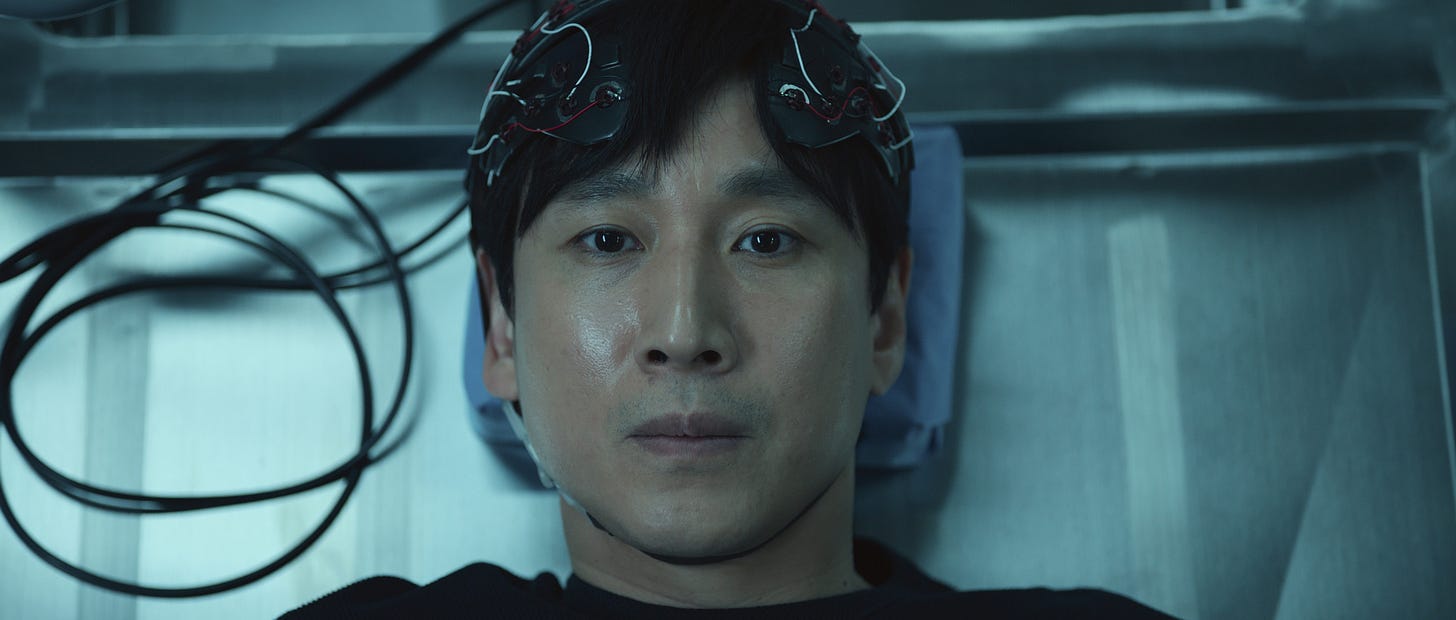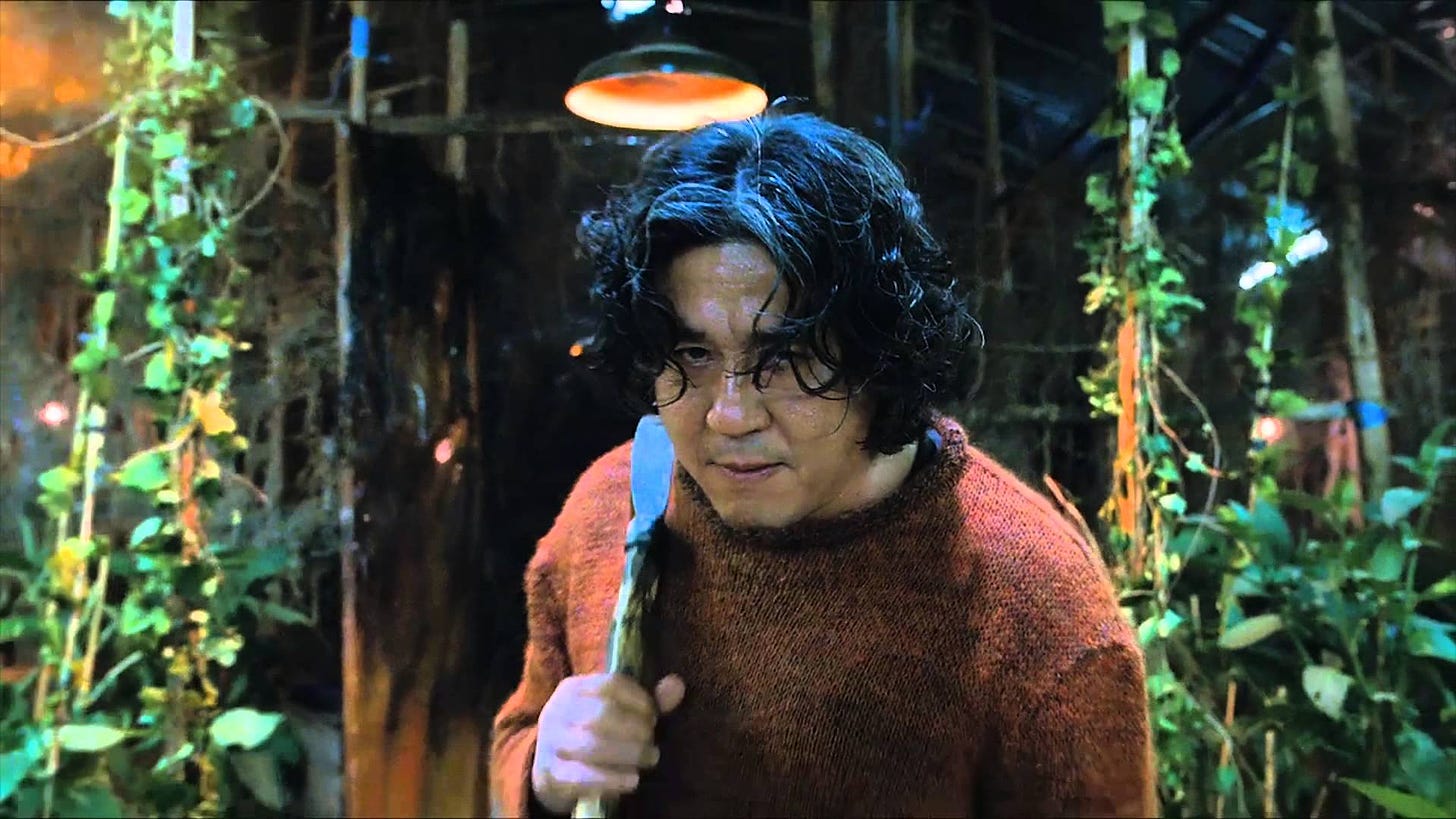'Dr. Brain': The Taming of Kim Jae-woon
The director of 'The Good, The Bad, The Weird' and 'I Saw the Devil' moves his act to television, with some of the edges sanded down.
Here’s something that happens in the first episode of Dr. Brain, the new six-episode Apple TV + series from South Korean genre specialist Kim Jee-woon, based on the webtoon by Hongjacga:
Dr. Sewon Koh (Lee Sun-kyun), a brilliant but eccentric and emotionally inaccessible brain scientist, is deep into the experimental phase on “brain-sync” technology, which allows for information to pass from one brain to another. (Basically, it’s like when you get a new computer and transfer all the crap from an older one into its hard drive, only far more complex and ethically dubious.) One dark and stormy night, Dr. Koh succeeds in transferring memories from a white mouse to a black mouse, and the black mouse suddenly knows how to navigate a maze successfully. The only trick is that the host animal needs to be dead or comatose in order for the synchronization to work.
In classic mad scientist fashion, Koh immediately wants to skip right to human trials, which his superior sanely denies, so he ropes a research assistant—the Igor to his Dr. Frankenstein—into sneaking into the hospital morgue after hours and doing a brain-sync on a fresh corpse. The corpse is chosen hastily—a real “Abby Normal” situation, to quote Young Frankenstein—and, of course, the doctor makes himself the guinea pig.
The Reveal is a reader-supported newsletter dedicated to bringing you great essays, reviews and conversation about movies (and a little TV). While both free and paid subscriptions are available, please consider a paid subscription to support our long-term sustainability.
Here’s something that happens on the second episode of Dr. Brain:
It turns out the good doctor has a tragic past and an equally tragic and potentially murderous present: As a child with a weird brain (giant hippocampus, tiny amygdala) and remote personality, he witnessed his mother, who said she would always be by his side, walk into traffic in an apparent suicide. As a grown-up, he lost his own son in a gas explosion while his wife, who may have been unfaithful to him, has gone missing. Soo naturally, he wants to perform brain-syncs on possible witnesses to the truth.
One of those witnesses is a cat. And along with cat POV and cat-visions, after syncing with its brain, Dr. Koh develops cat-like reflexes. When an errant foul ball is slapped in his direction from a nearby baseball field, he snags it in mid-air without looking.
Even for those who don’t know Kim Jee-woon’s work, this sounds like an entertainingly bugnuts series, right? A murder mystery about a mad scientist whose ginormous hippocampus is teeming with the memories, habits, instincts, and perhaps derangements of many host subjects—that sounds great. And, based on that description, those who do know Kim’s work would certainly expect that Dr. Brain would be entertainingly bugnuts. He’s proven himself a genre master over the years, defined less by an easily identifiable style than a chameleonic adaptability.
And with Dr. Brain Kim has once more proven himself adaptable: He has made a boring TV procedural.
It seems impossible, under the circumstances, for Kim to have flattened such lively material, given the combination of this premise and his willingness to adopt an ecstatic, go-for-broke energy when the mood strikes. But in a way, his versatility may account for why his first foray into television turns out to be such a disappointment. Among the wave of Korean directors who have electrified the international scene in the 21st century—Bong Joon-ho (Parasite, The Host), Park Chan-wook (Oldboy, The Handmaiden), Lee Chang-dong (Poetry, Burning), and the wildly prolific Hong Sang-soo (Turning Gate; Right Now, Wrong Then) among them—Kim has been the hardest to pin down, not least because he so rarely repeats himself. Since his pro wrestling comedy The Foul King in 2000, Kim has made edgy variations on J-horror (2003’s A Tale of Two Sisters), spaghetti Westerns (2008’s The Good, The Bad, The Weird), serial killer thrillers (2010’s I Saw the Devil), uncanny ‘80s Schwarzenegger revivals (2013’s grossly underrated The Last Stand), and historical action (2016’s The Age of Shadows).
Of the films he’s directed, Dr. Brain bears the strongest resemblance—and the strongest contrast—to I Saw the Devil, a memorably nasty provocation about revenge and the implacable nature of evil. Both projects are nocturnal, moody procedurals with a supernatural quality and a stoic hero sorting through personal tragedy and inexplicable violence with little fear and a lot of swallowed grief. In I Saw the Devil, Kim favorite Lee Byung-hun—who, oddly, appears briefly on the Netflix sensation Squid Game but not in Dr. Brain—stars as a special agent whose wife is the latest victim of a serial murderer played by Oldboy’s Choi Min-sik. As the killer puts him through various cat-and-mouse games, Lee’s character doesn’t resist it so much as become transformed by it, as if evil were a contagion that passes to those who try to confront it just as ruthlessly. The mouse turns into a cat.
As Dr. Koh in Dr. Brain, Lee Sun-kyun, most recognizable as the rich father in Parasite, dials back the charisma even further this time around. There’s an interesting story to be told about the era between when we meet Koh via flashback as an alienated (and alienating) boy and when we meet him as a doctor who’s still a mystery to his colleagues, a period where he must have developed enough of a personality to attract a wife and play father to an equally enigmatic son. There was likely never a time when Koh wasn’t obsessed with his work, but the death of his son and his wife’s disappearance gives him fewer reasons to be at home, where he can only be haunted by their memories. It just happened to work out that his research into brain-sync technology would help him solve the tragedies at the center of his own life.
And it’s here, gradually, that Dr. Brain settles into a hour-long mystery show built around an eccentric high-concept and a mild sentimental streak. It isn’t quite accurate to describe what Kim is doing here as “restraint” so much as “restrained,” as if the tacit demands of mainstream television are keeping the series from the unhinged science-fiction head-scratcher it cries out to be. In one of the better sequences, Kim exploits Koh’s feline powers for a beautifully staged shootout in a mall, where he manages the crossfire between cops and bad guys by contorting his body and striking with inhuman quickness. Yet even that sequence has the bloodlessness of network TV, rather than the explosive bursts of violence that define the shoot-‘em-up action of The Good, The Bad, The Weird or the more-is-more vulgarity of The Last Stand, a throwback to a gorier era in Hollywood filmmaking.
One of the more exciting loopholes in our new, content-starved streaming universe is that international auteurs have colonized television with their sensibilities more or less intact. There are plenty of great historical examples of auteur TV—David Lynch’s Twin Peaks, Rainer Werner Fassbinder’s Berlin Alexanderplatz, Krzysztof Kieślowski’s Decalogue, Lars von Trier’s The Kingdom—but there’s been a massive acceleration of projects lately where there’s little disparity between a director’s big-screen and small-screen work. The Paulo Sorrentino of The Young Pope is the same Sorrentino who exposed the grand indulgences and absurdities of the elite in Il Divo and The Great Beauty; the Jane Campion and Holly Hunter of Top of the Lake are the same Campion and Hunter who pressed the limits of feminine power in The Piano; and even Kim’s countryman, Park Chan-wook, who seemed like an odd fit for John le Carré’s The Little Drummer Girl, turned it into a stylistic tour-de-force, with the splashy colors and wildly ornate plotting of his other work.
Without knowing what constraints, if any, were placed on Kim with Dr. Brain, he’s either been boxed in by the conventions of an offbeat suspense series or imposed those conventions on himself. His skills as a craftsman are undeniable, between his conjuring of a noir ambience and his handling of an increasingly complicated puzzle that crosses timelines, half-complete memories, and a pile-up of nefarious secrets and intrigue. And yet the conceit of a mind-meld that imposes multiple personalities on one man’s already unstable hippocampus suggests possibilities that the show weirdly ignores. Once a scientist hooks himself up to a dead cat as casually as attaching jumper cables to a car battery, it’s right for viewers to set their expectations accordingly. Dr. Brain curiously sets about tamping them down.






As someone who really likes Good/Bad/Weird but thought that I Saw The Devil was WAY too much, it’s still depressing to me that he could be sanded down in any way.
Frankly the rise of prestige tv has only been a net negative for me. I’m very bad at watching television, especially 40+ min episode shows, because I generally have a hard time justifying the time spent on tv versus just watching more movies. When I DO watch tv I’m watching things that are considered classics, not stuff that’s still on the air.
It’s actually news to me that Park Chan-Wook even worked on a tv show. Maybe I’m out of touch. But I did make the effort to start Miami Vice in an effort to become a Michael Mann completist (I know his influence over the show is only partial) but I think I really need to make sure I see Top of The Lake and Little Drummer Girl.
"And along with cat POV and cat-visions, after syncing with its brain, Dr. Koh develops cat-like reflexes. "
how in the world is this not a riotous satire comedy??